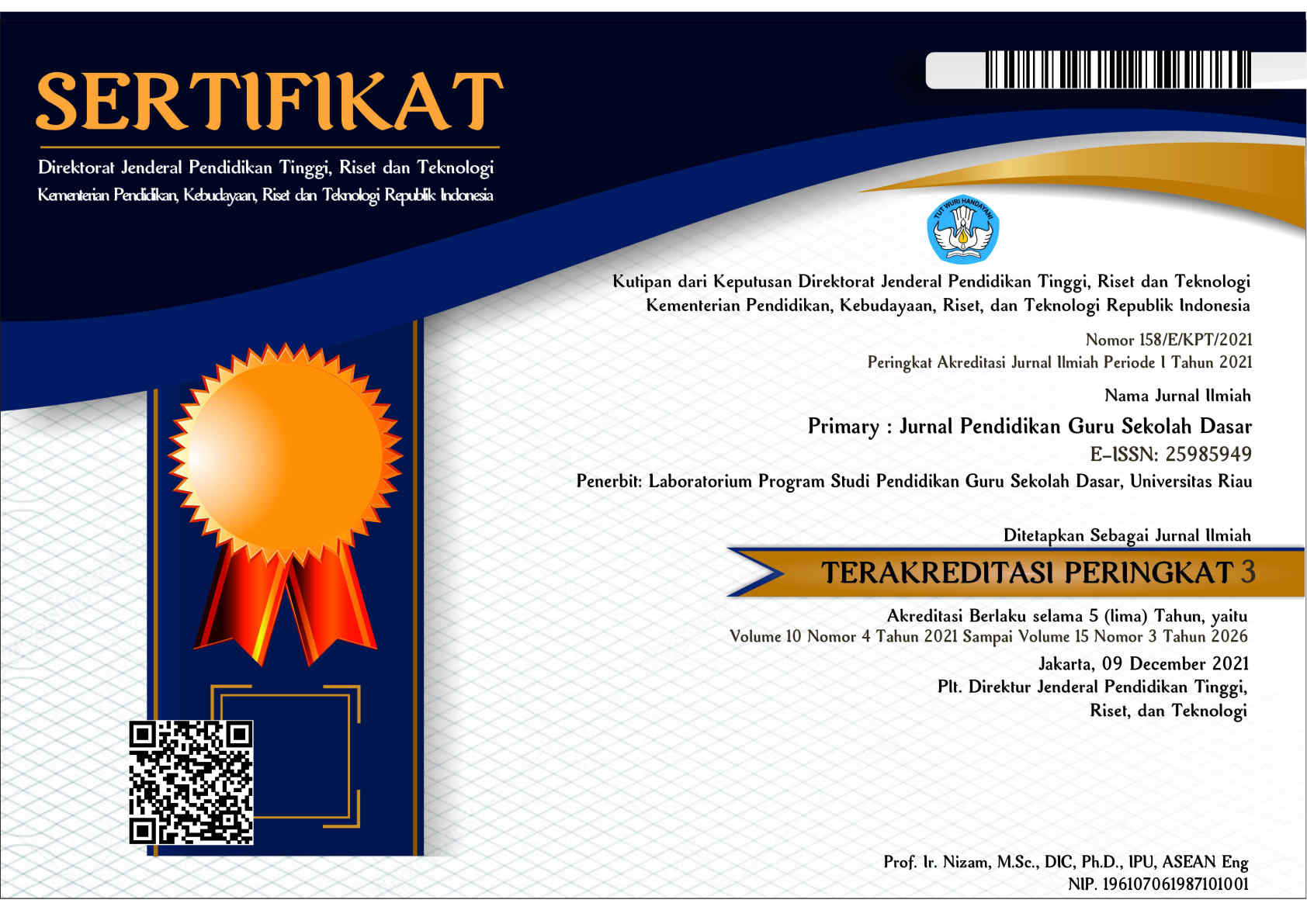APPLYING PROJECT-BASED LEARNING TO REINFORCE THE STUDENTS’ CHARACTER
Abstract
21st-century skills become a concerning matter for all educators due to the challenges that the young generation will face in the future. And educators are on the essential duty to implement the proper teaching methods to support the students in achieving the competencies as well. The presence of "The 4Cs" (Communication, Collaboration, Critical Thinking, Problem-Solving, Creativity, and Innovation) as an indicator for learning outcomes are important components that cannot be separated in areas of life. These four skills are also included in the teaching and learning models named project-based learning. It is a teaching model that can lead students to experience an inquiry process. Students are expected to be able to develop knowledge, skills, and attitudes as the basic assessment for teachers in the context of character education The outline of this paper is that first the concept of Project-Based Learning, the overview of character education, and lastly reviewing a number of theories of 4Cs skills to strengthen character building for students.
Keywords
Full Text:
PDFReferences
Adrian, Y., Rusman. (2019). Implementasi Pembelajaran Abad 21 dalam Kurikulum 2013. JURNAL PENELITIAN ILMU PENDIDIKAN Volume 12, Nomor 1.
Amabile, T. M. (2012). Componential Theory of Creativity. Harvard Business School, 1–10.
Astuti, I. D., Toto, T., & Yulisma, L. (2019). Model Project Based Learning (Pjbl) Terintegrasi Stem Untuk Meningkatkan Penguasaan Konsep Dan Aktivita. Jurnal Pendidikan Dan Biologi, 11(2), 93–98.
Baran, M., & Maskan, A. (2011). The effect of project-based learning on pre-service physics teachers electrostatic achievements. Cypriot Journal of Educational Sciences, 5(4), 243–257.
Baumeister, R. F., & Leary, M. R. (1997). Writing narrative literature reviews. Review of General Psychology, 1, 311–320. https://doi.org/10.1037/1089-2680.1.3.311
Connell, J.P., and Wellborn, J.G. (1991) Competence, autonomy, and relatedness: A motivational analysis of self-system processes. In Minnesota Symposia On Child Psychology. Vol. 23. pp. 43–77
Cooley, A. (2008). Legislating character: moral education in North Carolina’s public schools. Educational Studies, 43(3), 188-205. doi:10.1080/00131940802117563
Cropley, A.J. (2001). Creativity in education and learning: a guide for teachers and educators. London: Kogan Page Ltd.
Fleming, Douglas.S. (2000). A Teacher's Guide to Project-Based Learning. Washington, DC. : AEL, Inc.
Foster-Fishman, P. G. et al. (2001). Building collaborative capacity in community coalitions: A review and integrative framework. American Journal of Community Psychology, 29(2), 241–257
García, C. (2016). Project-based learning in virtual groups - collaboration and learning outcomes in a virtual training course for teachers. Procedia - Social and Behavioral Sciences, 228(June), 100–105. https://doi.org/10.1016/j.sbspro.2016.07.015
Häkkinen, P., Järvelä, S., Mäkitalo-Siegl, K., Ahonen, A., Näykki, P., & Valtonen, T. (2017). Preparing teacher-students for twenty-first-century learning practices (PREP 21): A framework for enhancing collaborative problem-solving and strategic learning skills. Teachers and Teaching, 23(1), 25–41.
Indasari, M. (2017). Mendidik Karakter Anak melalui Model Pembelajaran Berbasis Proyek (Sebuah Desain Pembelajaran Matematika yang Berkarakter). Scholaria: Jurnal Pendidikan dan Kebudayaan, Vol. 8 No. 1, Januari 2018: 105-108
Jusmaya, A., Efyanto, W. 2018. Empowering Student’s Critical Thinking by Applying Project Based Learning. Komposisi: Jurnal Pendidikan Bahasa, Sastra, dan Seni Volume 19 Nomor 2, 2018 page. 116-127 DOI: 10.24036/komposisi.v19i2.100657
Kokotsaki, D., Menzies, V., & Wiggins, A. (2016). Project-based learning: A review of the literature. Improving Schools, 19(3), 267–277.
Kubiatko, M. & Vaculova, I. (2011). Project-based learning: Characteristic and the experiences with application in the science subject. Energy Education Science and Technology Part B: Social and Educational Studies, 5(3), 65-74
Larmer, J., et al. (2015). Setting the standard for project-based learning: A proven approach to rigorous classroom instruction. USA: Buck Institute for Education
Miller, L. C., & Northern, T. (2011). 21st Century skills: prepare student for the future. Kappa Delta Pi Record. 121- 123.
Mulyaningsih, L., Rufi’I, Walujo, D.A. 2021. Project Based Learning dan Contextual Teaching and Learning Serta Gaya Belajar pada Ilmu Pengetahuan Alam. Jurnal Kajian Teknologi Pendidikan Volume 6, No 1
SEAQIL. (2020). HOTS- Oriented Module: Project-Based Learning. Jakarta: SEAMEO QITEP in Language
Simons, M., & Baeten, M. (2016). Student teachers’ team teaching during field experiences: An evaluation by their mentors. Mentoring & Tutoring: Partnership in Learning, 24(5), 415–440.
Thaariq, Z. Z. A., Lindawati, L., & Puspita, R. D. (2020). Profesionalitas Guru Sekolah Dasar dalam menghadapi Ragam Karakteristik Belajar. EduBasic Journal: Jurnal Pendidikan Dasar, 2(1), 61–71.
Tsybulsky, D., & Muchnik-Rozanov, Y. (2019). The development of student-teachers’ professional identity while team-teaching science classes using a project-based learning approach: A multi-level analysis. Teaching and Teacher Education, 79, 48–59.
Wijaya, E. Y., Sudjimat, D. A., Nyoto, A., & Malang, U. N. (2016). Transformasi pendidikan abad 21 sebagai tuntutan pengembangan sumber daya manusia di era global. In Prosiding Seminar Nasional Pendidikan Matematika. 1(26), 263- 278.
Williams, D. D., Yanchar, S. C., Jensen, L. C., & Lewis, C. (2003). Character education in a public high school: A multi-year inquiry into Unified Studies. Journal of Moral Education, 32(1), 3- 33.
Wong, G., Greenhalgh, T., Westhorp, G., Buckingham, J., & Pawson, R. (2013). RAMESES publication standards: Meta-narrative reviews. BMC Medicine, 11, 20. https://doi. org/10.1186/1741-7015-11-20.
DOI: http://dx.doi.org/10.33578/jpfkip.v12i3.9823
Refbacks
- There are currently no refbacks.
Copyright (c) 2023 Astri Komara Putri, Ganjar Muhammad Ganeswara, Warlim Isya

This work is licensed under a Creative Commons Attribution-NonCommercial-ShareAlike 4.0 International License.
____________________________________________________________
Primary: Jurnal Pendidikan Guru Sekolah Dasar
Secretariat
Program Studi Pendidikan Guru Sekolah Dasar
Gedung B1, FKIP Universitas Riau
Kampus Bina Widya Km. 12,5 Simpang Baru Panam
Pekanbaru Riau Indonesia 28293
e-mail : primary@ejournal.unri.ac.id



